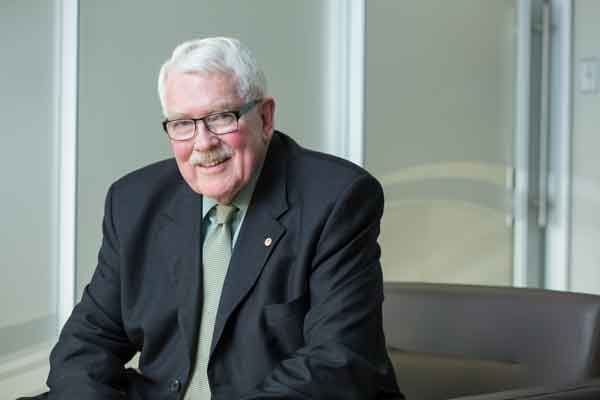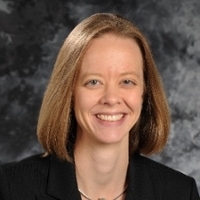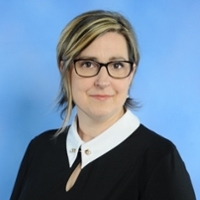About the Robertson Lecture Series
The Johnson Shoyama Graduate School of Public Policy is pleased to host the annual Robertson Lecture as a way to bring together thought leaders, academics, students and community members to discuss and share knowledge on current issues related to science and innovation policy in Canada.
Scientific knowledge, when properly and clearly shared with policymakers and the media, can greatly improve the quality of the human experience. It is critical that the findings scientists make through rigorous discipline and proven protocols are not misinterpreted or misunderstood in order to preserve the integrity of scientific leadership, public policy, and communications work.
The Robertson Lecture is made possible by a generous donation from Dr. Bev Robertson, his wife Elaine, and their family.
About Dr. Bev Robertson

Recruited to the University of Regina’s Physics Department in 1969 to work on an automated x-ray diffractometer, Dr. Robertson was also involved in the development of crystallographic software before retiring in 1997. He was later conferred as a professor emeritus in 2003. He was also deeply involved in establishing the University of Regina as a stand-alone academic institution rather than simply being an extension of the University of Saskatchewan in Saskatoon. His tireless work and diplomacy was essential in the fruition of the Saskatchewan Science Centre.
In addition to his academic career, Dr. Robertson was well-known in the Regina community as the owner of Bushwakker Brewing Company Ltd.
In 2014, Dr. Robertson gifted $500,000 to the Johnson Shoyama Graduate School to assist with the creation of the Centre for the Study of Science and Innovation Policy and the establishment of the Robertson Student Fellowship.
2025-2026 Robertson Lecture

Canada in the Age of Electricity
Presented by: Blake Shaffer, Associate Professor of Economics, University of Calgary
This keynote presentation will be followed up by a panel discussion on the Saskatchewan context featuring Dr. Margot Hurlbert, Canada Research Chair in Climate Change, Energy and Sustainability Policy; Professor, JSGS and Dr. Brett Dolter, Associate Professor, Department of Economics, University of Regina
The International Energy Agency has proclaimed that the world is entering the “Age of Electricity,” as power systems decarbonize and countries around the world increase electricity’s share in their economies Canada is in an enviable position, starting from a largely decarbonized electricity system, though with vast differences across provinces. How Canada navigates this transition and electrifies its economy will shape its competitiveness in an electric future. This Robertson lecture will examine the current state of Canada’s electricity systems, highlight the dramatic changes underway globally, and discuss what is required for Canada to continue decarbonizing and electrifying while maintaining affordability and reliability.
Event Details:
Thursday, February 5, 2026
3:00 – 4:30 pm CST. Reception to follow.
The 2025-26 Robertson Lecture will be a hybrid event – join us in CB 139, College Building, 2155 College Avenue, University of Regina or via Zoom.
Those interested in attending this free, hybrid lecture must register in advance. Zoom connection details will be sent by email the day of the event.
Click here to register.
About the Speaker
Blake Shaffer is an associate professor of economics at the University of Calgary and co-director of Canada’s Energy Modelling Hub. Prior to academia, Shaffer had a 15-year career in energy trading, specializing in electricity, natural gas and emissions markets. He holds a PhD in economics from the University of Calgary, Masters in economics from the University of Cambridge and a bachelor’s degree in environmental sciences from Queen’s University.
Past Speakers
From Farm to Fork: Saskatchewan’s role in the Future of Food Security and Innovation
Featuring: Sylvain Charlebois, Professor, Director, Agri-Food Analytics Lab, Dalhousie University
Join us at the 2024 Robertson Lecture featuring Sylvan Charlebois, who will discuss Saskatchewan’s role in the evolving landscape of food production and distribution. Discover how emerging consumer trends, transportation logistics, and global events are reshaping our food systems. Delve into Saskatchewan’s unique role in agri-food production, including its contributions to global food security, innovation and the urban-rural food connection. Join us to explore the dynamic interplay between food policy, safety, and economics, and consider how food producers and policy makers from municipal, provincial and federal levels of government can better understand and navigate our food supply chain.
Event Details:
Wednesday, October 16, 2024
7:00 - 8:30 pm CST
The 2024 Robertson Lecture was a hybrid event – guests joined us in CB 139, College Building, 2155 College Avenue, University of Regina & via Zoom.
This lecture was part of the University of Regina’s 50th Anniversary year of celebrations.
While some may argue that the issues we face in the 21st century are insurmountable – global warming, peak oil, economic collapse – Jennifer Keesmaat believes that now is the best possible moment, locally, nationally, and internationally, to engage in city building and taking ownership of our shared future.
Jennifer issues a call to action which implores cities to best address the most pressing challenges of our day: global poverty, affordable housing, quality of life, the need for innovation, the economy, traffic congestion, and climate change.
This lecture took place on Thursday, October 19, 2023, 12:00 - 1:30 pm CST
This lecture was delivered by Zoom.
For access to view the talk, please email jsgs.events@uregina.ca.
About the speaker:
Jennifer Keesmaat is passionate about creating places where people flourish. A renowned urban planner, she was named one of the “most powerful people in Canada” by Maclean’s, one of the “most influential” by Toronto Life, and one of the top Women of Influence in Canada. Keesmaat spent five years as Toronto’s Chief City Planner, where she was celebrated for her forward thinking and collaborative approach to city-building.
Today, Keesmaat is a founding partner of Markee Developments, where she, along with veteran developer Jason Marks, are developing new communities across the GTA as sustainable, liveable places that prioritize access to high-quality, affordable rental housing. She is also the CEO of The Keesmaat Group, where she provides inspiration through public speaking, and delivers impact through her consulting services on creating complete, walkable communities.
A Distinguished Visitor in Residence Emeritus at the University of Toronto, Keesmaat frequently shares her vision for cities of the future through a variety of publications including The Guardian, Foreign Affairs, Macleans, The Globe and Mail, the Toronto Star, and on her podcast, Invisible City. She was also the Chief Architect of the 2020 Declaration for Resilience in Canadian Cities, which provides a blueprint for adapting cities post-pandemic.
Keesmaat’s work has been repeatedly recognized by professional associations, including the 2016 President’s Award of Excellence from the Canadian Institute of Planners; the 2016 Bryden Alumni Award from York University; the 2017 City Builders Award from EDIT/the Design Exchange; and, most recently, the 2019 Edmund N. Bacon Award from the Center for Architecture and Design in Philadelphia. She also sits on the Advisory Board of the Urban Land Institute, Toronto; has been appointed to the International Panel of Experts of the Singapore Urban Redevelopment Authority; is a board member for May Mobility; and is on the President’s Planning and Growth Advisory Board for Ohio State University.
Keesmaat has a combined honours degree in philosophy and english from the University of Western Ontario, and a master’s in environmental studies, politics, and planning from York University.
With an accelerating climate and ecological crisis, floods, fires, extinctions, and heat domes are the new normal. In this talk, Dr. Chan addressed what we know about the causes of the climate and ecological crises, why 132 of the world’s nations concluded that transformative system change was the only desirable way forward, and what law and policy reform might achieve that. But science doesn’t dictate policy, which is where we come in as concerned citizens. He also reviewed what we know about how deep social change happens, and what the science says about how individuals can spark change.
This lecture was held on November 17, 2021 at 7pm via Zoom.
Dr. Chan is an interdisciplinary, problem-oriented sustainability scientist, trained in ecology, policy, and ethics from Princeton and Stanford Universities. He strives to understand how social-ecological systems can be transformed to be both better and wilder.
He leads CHANS lab (Connecting Human and Natural Systems), and is co-founder of CoSphere (a Community of Small-Planet Heroes). Dr. Chan is a former UBC Killam Research Fellow; a member of Canada’s Clean16 and Clean50 for 2020; a Leopold Leadership Program fellow; senior fellow of the Global Young Academy and of the Environmental Leadership Program; a member of the Royal Society of Canada’s College of New Scholars, Artists and Scientists; Lead Editor of the new British Ecological Society journal People and Nature; a coordinating lead author for the IPBES Global Assessment; and (in 2012) the Fulbright Canada Visiting Research Chair at the University of California, Santa Barbara.
Small Nuclear
What is the role of Small Modular Nuclear Reactors (SMRs) in providing Saskatchewan with reliable power? Could SMRs help meet climate change mitigation targets to keep global warming well below 2°C? How does Saskatchewan fit into Canada’s SMR action plan? A Saskatchewan survey shows public perception is fragmented and many people have questions surrounding SMRs.
This keynote presentation and panel discussion will help to answer these questions as we are joined by JSGS’s Dr. Margot Hurlbert, Canada Research Chair in Climate Change, Energy, and Sustainability Policy.
Due to COVID-19, the 2020-21 Houston Lecture was delivered by Zoom on February 17.
---
Presented by: Dr. Robert S. Walker, Senior Fellow, University of Ottawa’s Institute for Science Society and Policy and retired federal government scientist and executive.
Dr. Robert Walker is an independent advisor and retired public sector executive.
From November 2010 until his retirement in September 2015, Dr. Walker was with Atomic Energy of Canada Limited, a federal Crown Corporation, first as Senior Vice President Nuclear Laboratories and from October 2011 as the corporation’s President and Chief Executive Officer. From November 2014, he was concurrently the first President and CEO of AECL’s wholly owned subsidiary, Canadian Nuclear Laboratories.
Prior to joining AECL, Dr. Walker had a career of 33 years as scientist, manager and executive with the research and development arm of the Department of National Defence. From August 2005 until November 2010, he was the Assistant Deputy Minister Science and Technology at DND, the Chief Executive Officer of Defence Research and Development Canada and the departmental Chief Scientist.
Dr. Walker is a Senior Fellow at the University of Ottawa’s Institute for Science, Society and Policy. He is a member of McMaster University’s Board of Governors and the Chair of the Governing Board of the Canadian Centre for Electron Microscopy, located at McMaster. From 2009 to 2012, he served as the Chair of the NATO Research and Technology Board, the senior oversight body for cooperative research within the NATO framework. From 2012 to 2018, he was Chair of the Board for the Network of Centers of Excellence in Marine Environmental Observation, Prediction and Response (MEOPAR), hosted by Dalhousie University. Dr. Walker is a member of the Council of Advisors of the Conference of Defence Associations Institute and a director and past Chair of the Board of the Pembroke Boys and Girls Club.
Dr. Walker earned a BSc in Physics from Acadia University (’73), an MEng in Engineering Physics (’75) and a PhD in Electrical Engineering from McMaster University (’77). He has been awarded honorary Doctors of Science from McMaster University (2013) and Acadia University (2017) and an honorary Doctor of Engineering from the Royal Military College of Canada (2015). He is a graduate of the National Defence College and a Fellow of the Canadian Academy of Engineering. Dr. Walker is a recipient of the Canadian Forces Medallion for Distinguished Service and the Canadian Nuclear Association’s 2015 Ian McRae Award of Merit.
Panelists include:
 Dr. M. Shannon Bragg-Sitton, Lead, Integrated Energy Systems, Idaho National Laboratory (INL)
Dr. M. Shannon Bragg-Sitton, Lead, Integrated Energy Systems, Idaho National Laboratory (INL)
Dr. Bragg-Sitton is a pioneer in the innovative application of nuclear energy alongside other clean energy generators, seeking to maximize energy utilization, generator profitability, and grid reliability and resilience through systems integration.
As a senior staff member in the Nuclear Science & Technology Directorate at Idaho National Laboratory (INL), Shannon is the Lead for Integrated Energy Systems (IES). Within this role, Shannon serves as the co-Director for the INL Laboratory Initiative on IES, which includes focus areas for thermal energy generation, power systems, data systems, and chemical processes/industrial applications. Shannon is also the INL lead for the DOE Applied Energy Tri-Laboratory Consortium, which includes INL, the National Renewable Energy Lab, and the National Energy Technology Lab—this consortium seeks to develop future energy systems that leverage all clean energy assets, across all energy use sectors.
Shannon has held multiple leadership roles in DOE Office of Nuclear Energy programs since joining INL in 2010, ranging from space nuclear power and propulsion systems, to advanced nuclear fuel development, to her current work in integrated system design and demonstration. She currently serves as the National Technical Director for the DOE-NE IES program within Crosscutting Technologies Development.
Dr. Bragg-Sitton holds a PhD and MS in Nuclear Engineering from the University of Michigan, an MS in Medical Physics from the University of Texas at Houston, and a BS in Nuclear Engineering from Texas A&M University.
 Diane Cameron, Director of the Nuclear Energy Division, Natural Resources Canada
Diane Cameron, Director of the Nuclear Energy Division, Natural Resources Canada
Diane Cameron is Director of the Nuclear Energy Division at Natural Resources Canada. As Director, she heads up the division responsible for leading and coordinating Canadian federal policy on nuclear energy. Ms. Cameron joined the Government of Canada in 2007 to work on environment, energy, and trade policy—including US relations and international negotiations. Ms. Cameron served as Chair of the Canadian Roadmap for Small Modular Reactors (SMRs).
Prior to government Ms. Cameron worked in management consulting and engineering in the private sector specializing in global value chains and advising international logistics companies such as Canadian National Railway, Schneider Trucking, and Crowley Ocean Freight.
She received a Masters in Technology and Policy from M.I.T., where she was named Alfred Keil Fellow for Wiser Uses of Science and Technology. Ms. Cameron also holds a Bachelor of Applied Science in Systems Design Engineering from the University of Waterloo.

